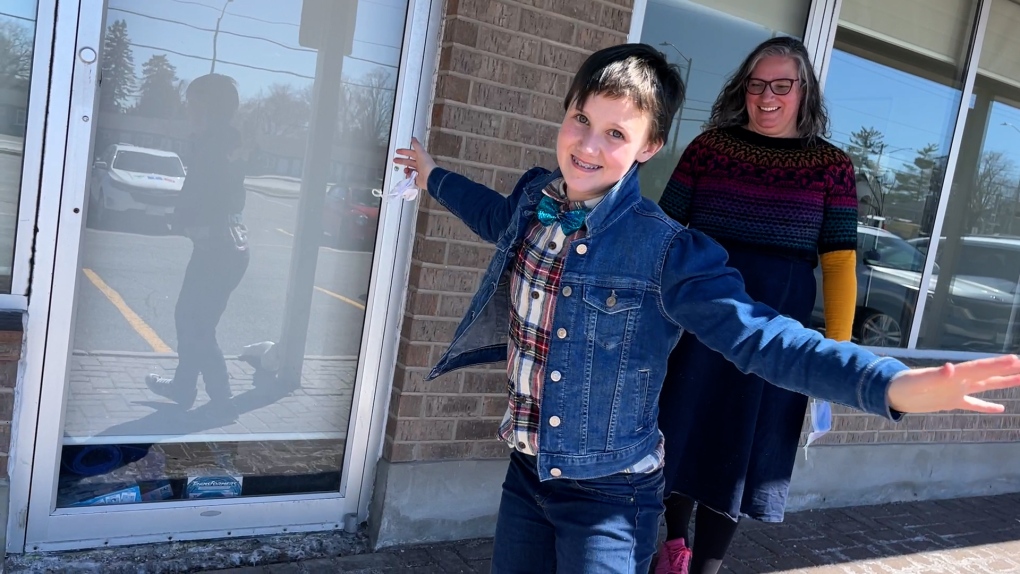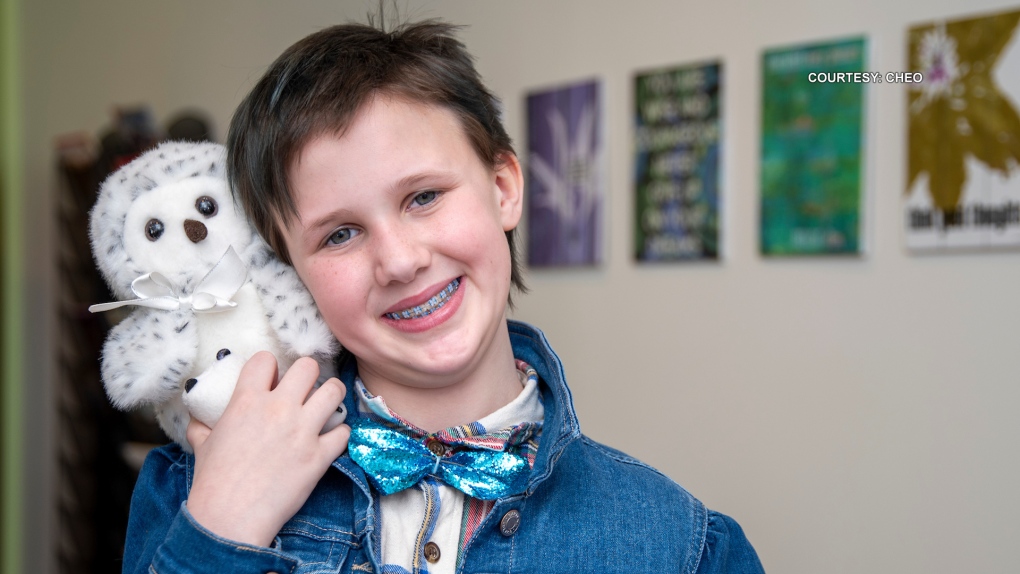Eluin “Lu” Oudhoff is a spunky, lively, joyful 12-year-old with a passion for theatre.
“The thing I like about theater is it’s kind of just really fun!”
 Eluin ‘Lu’ Oudhoff stuggled with depression and anxiety from a young age, but thanks to CHEO, Lu found joy, life, and a passion for theatre. (Leah Larocque/CTV News Ottawa)
Eluin ‘Lu’ Oudhoff stuggled with depression and anxiety from a young age, but thanks to CHEO, Lu found joy, life, and a passion for theatre. (Leah Larocque/CTV News Ottawa)
But they say they didn’t always feel this way. At a young age, Lu struggled with mental health challenges such as depression and anxiety. “I just kind of stopped existing for a while and just kind of stopped feeling because I felt so sad. I was like, okay, I feel so sad and I feel so angry and I feel just so horrible that I’m just going to stop feeling that,” they said.
Lu’s family had relocated from Norway to Ottawa in June of 2022. It was a tough, stressful transition to a new life.
Lu’s parents say they first starting noticing something was different with Lu when they were about four years old. Lu was experiencing sensory issues (sensitivity to sound), rigid thinking and anxiety. Challenges were further triggered when they lost their family pet and Lu’s best friend, Skyler the cat.
Lu says, “I just needed time out from existence because, like, existence as a whole can sometimes be a lot.”
Lu’s mom Roos Spanjers says that is when she knew it was time to reach out for help. “I think that’s one of the hardest parts of being a parent, is seeing your kids struggle.”
The family didn’t have a doctor, so they went to a walk-in clinic and Lu was referred to CHEO’s 1Call1Click, a coordinated access and navigation service that helps families connect with the right mental health and addiction service and care based at CHEO.
Demand for mental health services high, waitlist long
The demand for mental health services in Ottawa and across the province is high, and the waitlist is long.
Dr. Neil Gotthiel is a psychiatrist at CHEO and says, “There’s a high demand, but that’s an understatement. It’s a demand that’s been growing. And not only do we have so many more people seeking services and needing support, the severity of struggle that people are coming to the hospital for services for, has also increased.”
Gotthiel says, “We desperately want to be able to reduce wait times and have people seen sooner. So we need some resources. We need to have the ability to hire more people, have more people here.”
Lu waited six months to see a member of the mental health team.
“I was like, ‘wait, there’s actually someone here who wants to help me.’ And that was really exciting,” they said. “Before I got help from CHEO I was just kind of treading water.”
Dialectal behavioral therapy: providing toolbox of coping strategies
Spanjers says it was a relief for her child to finally be able to get the help they needed. “There is support available. There’s medication that can help you out, help you get back on your feet, and there’s coping mechanisms that can help you, too.”
Lu was able to get a prescription for some medication – Lu says they had the extra support needed to get them to become more like themselves again.
Lu also started dialectal behavioural therapy (DBT) in a group format. This group is geared toward pre-teens and teens with their parents. It’s a 12-week program and provides a toolbox of coping strategies. The sessions help kids figure out the correspondence of body and mind – how responses are connected.
“Imagine you’re trying to teach skills, skills related to managing your emotions, distress, and tolerance,” Dr. Gotthiel describes. “It’s a way of saying, when you’re in the middle of a crisis, how can you manage to make it through without making it worse, and you’re doing it together with your parents. So it’s a great opportunity for kids to learn these skills, learn from each other, learn from different families, and then go off and practice it and come back for the next set of skills in the next group.”
 Eluin ‘Lu’ Oudhoff took part in a dialectal behavioural therapy group program at CHEO in 2023 to help with mental health struggles. (Leah Larocque/CTV News Ottawa)
Eluin ‘Lu’ Oudhoff took part in a dialectal behavioural therapy group program at CHEO in 2023 to help with mental health struggles. (Leah Larocque/CTV News Ottawa)
In the early days, Lu and Spanjers were at CHEO every Wednesday afternoon for 1.5 hours. They finished the session at the end of January.
Lu says, “Dr. Gotthiel, he kind of helped me understand the waters I was in. Like, not all things that look like sharks are sharks. Some of them are just really funky looking dolphins! It was kind of like getting swimming lessons because there were other people there, too. That was a really good feeling.”
Strength in sharing story to help others
Spanjers says they were very happy with the care but there is a need to improve wait times and facilitate more involvement from the entire family. “I think that Eluin (Lu)’s success is based on the multi-pronged approach,” she says. “The medication, the therapy, the overlap between Dr. Gottheil as Lu’s doctor and the facilitator in the DBT group offered the continuity we needed.
“I think what is really, really important is that people know the quality of care that is given by to the expertise that they have, the ability, for example, with Lu, they have to find a way to approach each individual kid at the level that they need.”
Dr. Gotthiel says Lu’s bravery to share their story is important to help other kids. “When people seek out mental health services, it takes an enormous amount of courage. There are lots of people that have a hard time recognizing that seeking support and seeking help is a sign of strength.”
As for Lu, they want to continue to grow her career in theatre and has dreams of taking on some very big roles — like Elphaba from the musical Wicked. But they says their biggest role is making sure other kids know they aren’t alone with CHEO.
“I kind of want them to know, ‘Hi, for some of you, I was in the same place as you and I’m here now and I’m doing fabulous!”
The 41st CHEO Telethon continues all week on CTV News Ottawa, CTV Morning Live and Newstalk 580 CFRA, with the grand finale on CTV Ottawa Saturday from 4 p.m. to 7 p.m.
You can make a donation to the CHEO Telethon online at www.cheotelethon.com or by calling 613-730-CHEO (2436).